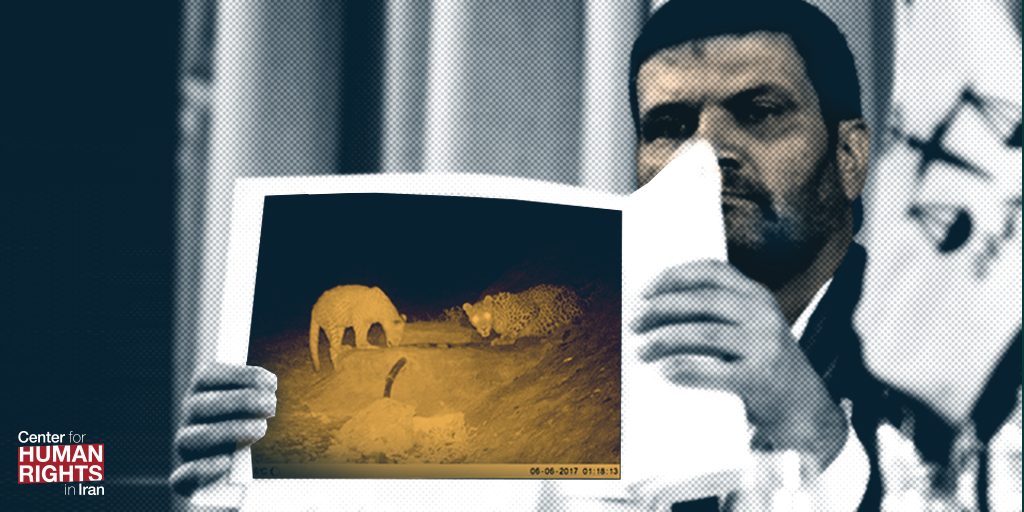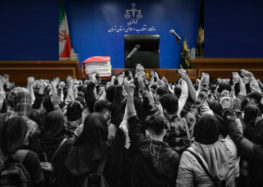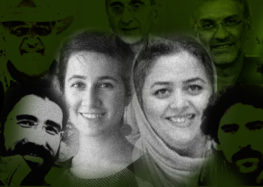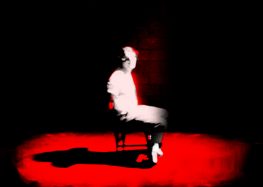Families Denied Access to Secretive Trial of Iran’s Detained Conservationists

International Outcry Against Rampant Denials of Due Process
Detained conservationist Morad Tahbaz was summoned to two closed-door sessions February 24-25, 2019, in Tehran’s Revolutionary Court system, the Center for Human Rights in Iran (CHRI) has learned.
A knowledgeable source told CHRI that the families are unlawfully being denied access to the trial:
“The families are not even being let inside the courtroom. The only thing the lawyers are telling the families is that everything will turn out okay. The families and the defendants cannot speak freely because an [security] agent is always present during their meetings inside prison.”
Tahbaz, conservation scientist Niloufar Bayani, and two other conservationists are facing the charge of “corruption on earth,” which could carry the death penalty.
Tahbaz is one of nine conservationists who were arrested by agents of the Islamic Revolutionary Guard Corps’ (IRGC’s) Intelligence Organization in Tehran in January 2018 and held for months in solitary confinement until finally granted extremely restricted access to counsel shortly before their trial.
One of the conservationists, Iranian Canadian sociologist Kavous Seyed-Emami, died in Tehran’s Evin Prison in February 2018 less than two weeks after he had been detained.
Since the trial began with the reading of the indictment against the remaining eight, the detainees’ families have been denied access to information about their loved ones’ court sessions.
Denial of Due Process
Iran’s judiciary has strived to keep the trial secret but CHRI has learned that as of February 25, each of the eight conservationists will be tried separately at Branch 15 of the Revolutionary Court.
Some of the detainees have been blocked from hiring counsel of their choice and told to choose a lawyer from a list approved by the court.
The conservationists have also not been given sufficient time to consult with their lawyers or prepare their defense even though the prosecution has had 12 months to build cases against them.
Many of the accusations against the defendants—Bayani, Tahbaz, Houman Jowkar, Taher Ghadirian, Sepideh Kashani, Amir Hossein Khaleghi, Sam Rajabi and Abdolreza Kouhpayeh—are based on forced “confessions” extracted under extreme physical and psychological pressure, Bayani told the court last month.
When Bayani stood up on the second day of the reading of the indictment on January 30, 2019, and objected to its references to forced “confessions,” she was unlawfully barred from being present in court on the third and fourth day alongside her co-defendants.
The indictment was read to the defendants, who were not given their own copies, during four court sessions on January 30, February 11, 12 and 13 at Branch 15 of the Revolutionary Court presided by Judge Abolqasem Salavati.
Salavati is notorious in Iran for issuing harsh sentences in politically sensitive cases. In interviews with CHRI, several human rights lawyers who have worked in Iran criticized Salavati for ignoring arguments by the defense in court and bowing to the demands of the prosecution, especially in cases in which the arresting authority was the IRGC’s Intelligence Organization.
Six of the eight defendants have been appointed lawyers approved by the court. Judge Salavati has allowed the other two to have their own lawyers.
Sam Rajabi’s lawyer, Mohammad Hossein Aghasi, was rejected by Judge Salavati and not allowed to be present during the reading of the indictment.
In a letter to Member of Parliament (MP) Mahmoud Sadeghi, Rajabi’s sister, Katayoun Rajabi, complained about the banning of her brother’s chosen lawyer from the courtroom and described it as a violation of Article 48 of the Criminal Procedures Regulations.
“Mr. Sadeghi, I urge you to support us as a parliamentary representative now that my brother is being tried behind closed doors and denied the lawyer of his own choice,” she wrote.
On February 25, the state-run Islamic Republic News Agency (IRNA) quoted an unnamed source claiming the defendants were granted access to their lawyers.
Reacting to complaints from a lawyer who had not been permitted by Judge Salavati to advise his client in court, IRNA’s source said: “During court proceedings is not the right time for lawyers and clients to meet and have a discussion.”
The IRNA report described the defendants as alleged spies who had engaged in “espionage against military centers.” It remains unclear exactly why the conservationists have been detained without due process for the past 12 months.
The IRGC’s Intelligence Organization arrested the eight conservationists on January 25, 2018. The day before, the agents had arrested their colleague, sociologist Dr. Seyed-Emami, who died suddenly in Tehran’s Evin Prison on February 8 while held there without access to a lawyer for interrogations.
The remaining eight, all staffers of the Tehran-based Persian Wildlife Heritage Foundation, where Seyed-Emami was managing director, were held incommunicado without access to counsel for several months after their arrests.
Since late January 2019, at least three people familiar with the cases have been interrogated in Tehran.
“This month [February] at least one person was arrested for a day and last month [January] two people were interrogated for four to five hours,” said a source on the condition of anonymity, adding that at least two of the detainees’ computers were confiscated from their homes.
The source added that the three were released after being warned not to speak publicly about the cases or their own detentions.
Subjecting friends, family members and lawyers of defendants held in politically sensitive cases to various forms of harassment and intimidation is common in Iran to prevent them from speaking to media outlets.
Bayani and Seyed-Emami’s widow, Maryam Mombeini, were both pressured to engage in staged scenes set up by Iranian agents to implicate them in the false narrative that the prosecution has been building around the conservationists.
In one instance, plainclothes agents transported conservation scientist Niloufar Bayani out of Evin Prison in Tehran to several locations in an affluent town for a day and directed her to engage in specific acts while filming her without her consent.
In another instance, plainclothes agents including a film crew forcefully entered the home of now-deceased academic Kavous Seyed-Emami (one of the original nine conservationists arrested who died while in detention in Evin Prison in February 2018 under highly suspicious circumstances) and pressured his grieving widow to make false statements on camera while denying her access to a lawyer.
Widow’s Travel Ban Extended
Mombeini has been barred from leaving Iran despite calls from the Canadian government for her to be granted permission to travel back to Canada to live with her two sons who left the country in March.
The travel ban that was imposed on her that month was recently extended for another three months even though she has not been formally charged, her son Ramin Seyed-Emami told CHRI on February 19.
“…She herself has not been accused of anything and yet they have banned her from traveling! Someone explain to me how this can be justified under religious, ethical, legal, political, intelligence or security principles?!” tweeted Member of Parliament Mahmoud Sadeghi after hearing of the extension.
Iranian authorities will soon review the travel ban on Maryam Mombeini, the wife of Canadian-Iranian conservationist who died a year ago in Evin Prison under suspicious circumstances, according to the family’s lawyer.
“After talking with the judiciary’s representative in Evin Prison, we were told that inquiries will be made in the coming week to ask permission to end the ban on my client,” attorney Payam Derafshan told a state media outlet on February 27.
Seyed-Emami’s family has petitioned the Islamic Republic of Iran Broadcasting (IRIB) organization to allow them to respond to the unsubstantiated accusations the broadcaster has aired against the deceased academic.
Three major state agencies in Iran, including the country’s highest security body, have stated that the detained conservationists did not commit espionage.
Their continued detainment has prompted an international outcry. The UN has called the charges against the conservationists “hard to fathom” and in February 2018 stated, “Nowhere in the world, including Iran, should conservation be equated to spying or regarded as a crime.”
Twenty-six members of the European Parliament have urged Iranian President Hassan Rouhani to free the eight conservationists.
The MEPs also reminded the president that 12 months after Iranian Seyed-Emami was found dead in Evin Prison where he was being held for interrogations, Iranian authorities have not conducted an impartial investigation into his death and have placed a travel ban on his wife.






